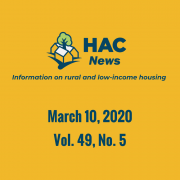News Formats. pdf
March 10, 2020
Vol. 49, No. 5
USDA and HUD offer resources on coronavirus • Household Water Well System Grants available • HAC research brief tackles tax relief for sellers of affordable rental properties • HUD guidance describes new provisions for small rural PHAs • File information regarding a regional plan by June 30 to garner extra points for some USDA RD funding • Housing legislation moves forward in the House • CFPB provides FAQs for mortgage disclosure rule • New RD Deputy Under Secretary named • Census to replace American FactFinder • Affordable Homes at Risk • Many Living in Rural America Struggling with Housing as Cost of Living Outstrips Wages • Toolkit for State and Local Government Officials • Understanding Rural Attitudes Toward the Environment and Conservation in America • SAVE THE DATE FOR HAC’S 2020 RURAL HOUSING CONFERENCE! • Need capital for your affordable housing project?
HAC News Formats. pdf
March 10, 2020
Vol. 49, No. 5
USDA and HUD offer resources on coronavirus.
Both departments provide basic resources and a link to the Centers for Disease Control and Prevention for the most up to date information. HUD suggests housing providers can share CDC fact sheets to help stakeholders understand the virus and steps to protect themselves. It also offers an infectious disease toolkit for Continuums of Care, noting that people experiencing homelessness are especially vulnerable. The National Health Care for the Homeless Council has collected other resources and information on the subject. USDA provides additional information about food safety and pet safety. Articles published by the Daily Yonder and the Center for American Progress present differing perspectives about rural risk: “Rural Areas at Less Risk of Coronavirus Currently” because people have contact with fewer others, or “Rural Americans are Vulnerable to the Coronavirus” because they have larger proportions of vulnerable populations, residents often cannot work at home, and access to health care is limited.
Household Water Well System Grants available.
USDA offers grants to nonprofits to establish revolving loan funds that will make loans for household water well systems in places with populations under 50,000, tribal lands and colonias. Apply by May 31. For more information, contact Derek Jones, USDA RD, 202-720-9640.
HAC research brief tackles tax relief for sellers of affordable rental properties.
As the rural rental housing crisis builds, often the best way to preserve a property’s affordability is to sell it to an entity that will keep operating it as an affordable rental. Among the many issues involved in arranging such a sale is the need to cover the seller’s tax bill. A new HAC research brief, Tax Considerations for Rural Housing Preservation, looks at this issue and possible solutions.
HUD guidance describes new provisions for small rural PHAs.
While HUD is developing regulations to implement provisions of a 2018 law related to small PHAs in rural places, it has published initial guidance explaining how it is defining small and rural, and how it is currently implementing provisions that take effect without regulations. Just over 1,500 PHAs fit the definition; see the list of “Section 209 Small Rural PHAs.” They can inspect voucher units less often than other PHAs and are exempt from environmental review requirements for development or rehab projects costing under $100,000. For more information, contact Harold Katsura, HUD, 202-402-3042.
File information regarding a regional plan by June 30 to garner extra points for some USDA RD funding.
Applicants for community facilities, water and waste, or business programs may receive priority points if their projects support strategic economic and community investment plans. Applicants must submit a form by June 30 to be eligible. For more information, contact an RD state office.
Housing legislation moves forward in the House.
On March 2 the House of Representatives passed the Yes In My Backyard Act (H.R. 4351), which would require governments receiving CDBG funding to report on land use policies that support affordable housing production, and the Improving FHA Support for Small Dollar Mortgages Act (H.R. 5931), which would require the FHA to review its policies, practices and products to identify barriers to supporting mortgages under $70,000. Two other measures were approved by the House Financial Services Committee on February 28 but have not yet been considered by the full House. The Housing is Infrastructure Act (H.R. 5187) would authorize substantial funding increases for numerous housing programs, including USDA’s MPR and Section 504 programs. The Housing Fairness Act (H.R. 149) would fund nationwide housing discrimination testing as well as research and education and would increase appropriations for the Fair Housing Initiatives Program.
CFPB provides FAQs for mortgage disclosure rule.
The consumer agency’s questions and answers pertain to compliance with the TILA-RESPA Integrated Disclosure Rule (TRID) for home mortgage closing cost estimates. Specific topics include corrected closing disclosures and the three business-day waiting period, model forms, construction loans, loan estimates and lender credits.
New RD Deputy Under Secretary named.
Donald “DJ” LaVoy, who has served as Deputy Under Secretary for Rural Development at USDA since September, is retiring. Bette Brand will move into the deputy position. She has most recently been the Administrator of the Rural Business-Cooperative Service. The Under Secretary position, eliminated by USDA Secretary Sonny Perdue and reinstated by the 2018 Farm Bill, remains vacant.
Census to replace American FactFinder.
The U.S. Census Bureau will take its American FactFinder tool offline on March 31. The AFF tool will be replaced with the new data.census.gov utility. While the transition takes place, data and information on rural communities across the country will always be available at HAC’s Rural Data Portal. For more information on HAC’s data portal, contact dataportal@ruralhome.org.
Recent publications and media of interest
Need capital for your affordable housing project? HAC’s loan funds provide low interest rate loans to support single- and multifamily affordable housing projects for low-income rural residents throughout the U.S. and territories. Capital is available for all types of affordable and mixed-income housing projects, including preservation, farmworker, senior and veteran housing. HAC loan funds can be used for pre-development, site acquisition, site development and construction/rehabilitation. Contact HAC’s loan fund staff at hacloanfund@ruralhome.org, 202-842-8600.
Please note: HAC is not able to offer loans to individuals or families. Borrowers must be nonprofit or for-profit organizations or government entities (including tribes).
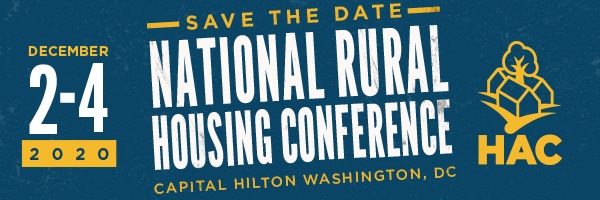

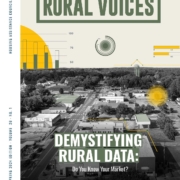
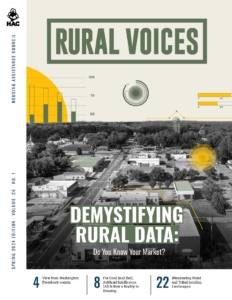
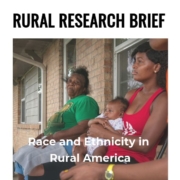 Housing Assistance Council
Housing Assistance Council